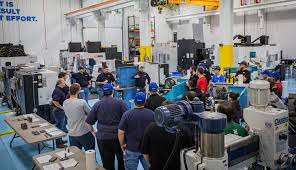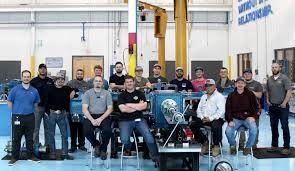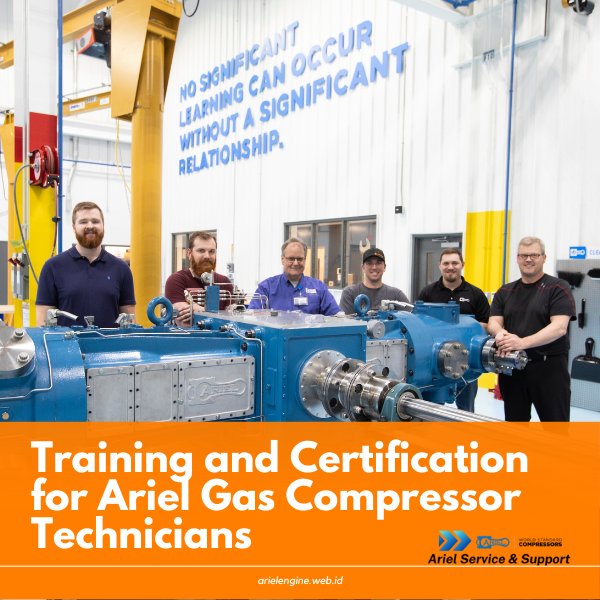When you hear the term gas compressor, it probably doesn’t immediately make you think of high-tech systems or skilled professionals. But if you’ve ever wondered who keeps these big machines running smoothly, it’s Ariel Gas Compressor Technicians. These experts play a crucial role in ensuring that gas compressors, like the ones made by Ariel, work efficiently and safely.
If you’re thinking about becoming an Ariel Gas Compressor Technician, there’s a lot to know. From understanding the mechanics behind the compressor to learning how to troubleshoot and maintain it, this job requires both technical know-how and practical experience. But don’t worry—if you’ve got the passion for working with heavy-duty equipment and are willing to invest in your training, you’re in the right place.

In this guide, we’ll cover everything you need to know about training and certification for Ariel Gas Compressor Technicians. By the end, you’ll have a good understanding of what’s involved and how you can kickstart your career in this niche but critical field.
1. What Exactly Does an Ariel Gas Compressor Technician Do?
Before diving into the training and certification stuff, it’s important to understand what a technician actually does. Ariel gas compressors are used in the oil and gas industry, power plants, and a variety of other settings where natural gas needs to be moved or compressed. These compressors help to increase the pressure of the gas so it can be transported over long distances, or used in industrial processes.
An Ariel Gas Compressor Technician is the person responsible for making sure that these compressors run smoothly. Some of the key tasks include:
- Installation: Technicians set up new compressors at oil fields, gas plants, or compressor stations.
- Maintenance: They regularly inspect and maintain the compressors to ensure they operate efficiently. This includes oil changes, cleaning, and replacing parts like seals or valves.
- Troubleshooting: If something goes wrong with the compressor, technicians are called in to diagnose the issue and fix it quickly to avoid downtime.
- Repairs: They repair compressors when needed, sometimes doing complex overhauls or part replacements.
- Upgrades: Technicians may also help upgrade older equipment to improve performance or to meet new regulations.
In short, these technicians are the backbone of the gas compression industry. Without them, the machines wouldn’t work, and that could cause serious disruptions in gas supply and transport.
2. Do You Need Formal Training to Become a Technician?
So, do you need formal training to work with Ariel Gas Compressors? The short answer is yes, but don’t let that scare you. While it’s possible to learn some basics on the job, having formal training really sets you up for success. Plus, it makes you more attractive to employers and gives you the confidence to handle high-pressure situations (pun intended!).
A good training program will teach you everything from compressor mechanics to safety protocols, and will help you get familiar with Ariel’s specific models. The goal of training is to ensure that you can handle the complex systems that Ariel compressors use, and also troubleshoot issues when they arise.
3. Key Skills You’ll Learn in Ariel Gas Compressor Technician Training

When you sign up for a technician training program, here are the skills you can expect to gain:
a. Compressor Mechanics
You’ll learn how gas compressors work on a technical level. This includes understanding components like pistons, cylinders, and valves, as well as learning how each part interacts to compress gas efficiently.
b. Gas Compression Principles
Compression is more than just pushing gas into a smaller space. You’ll understand the science behind how compressors change gas pressure and why it’s important for transporting natural gas or powering machinery.
c. Maintenance and Inspection
A huge part of a technician’s role is maintaining compressors. Training will teach you how to spot signs of wear and tear, when to change parts, and how to keep everything running at peak performance.
d. Troubleshooting and Repairs
Every technician’s worst nightmare is a compressor failure. But with the right training, you’ll learn how to quickly identify problems, from simple leaks to major mechanical failures, and how to fix them effectively.
e. Safety Protocols
Working with gas compressors is a high-stakes job, which is why safety is always top of mind. Training will cover everything from handling hazardous materials to preventing accidents in dangerous environments.
f. Computer-Based Monitoring
Ariel compressors often come with digital systems that help monitor their performance. You’ll learn how to interpret data, diagnose issues based on those readings, and make adjustments when necessary.
4. How to Get Certified as an Ariel Gas Compressor Technician

While formal training gives you the skills, certification is what proves you know your stuff. Certification helps you stand out in the job market, and in some cases, it may even be required for certain roles.
The good news is that Ariel offers specific certification programs for compressor technicians. These programs are designed to ensure that you meet the industry standards and are fully capable of handling Ariel’s equipment.
a. Ariel Certified Technician Program
Ariel offers its own Ariel Certified Technician program. It’s a well-recognized certification in the gas compression industry. This certification proves you have comprehensive knowledge of Ariel compressors and are qualified to handle their maintenance, troubleshooting, and repair.
The program involves both classroom instruction and hands-on experience. You’ll be expected to pass both a written test and a practical exam, which will assess your ability to work on Ariel compressors under real-world conditions.
b. Other Industry Certifications
Apart from Ariel-specific certification, there are other certifications that could boost your credentials as a gas compressor technician. Some of the more recognized ones include:
- API 618 Certification: This is a certification for reciprocating compressors, which many gas compressors are. It focuses on the standards for design, performance, and maintenance.
- OSHA Certification: Safety is a huge deal when working with compressors, and OSHA (Occupational Safety and Health Administration) certifications ensure that you’re up to speed with safety regulations and practices.
- NCCER Certification: The National Center for Construction Education and Research (NCCER) offers a certification for mechanical and industrial technicians, which can be useful if you plan to work on compressors as part of a broader mechanical skillset.
5. How Long Does It Take to Get Certified?
The time it takes to get certified depends on several factors:
- Training Program Length: A full Ariel Gas Compressor Technician training program can take anywhere from several weeks to a few months. If you’re enrolled in a comprehensive program, it could be a full-time commitment. However, many training centers also offer part-time options that work around your schedule.
- Hands-On Experience: You’ll need to gain practical experience, and the more time you spend working on compressors, the quicker you’ll be ready for the certification exam.
- Written and Practical Exams: After completing the training, you’ll have to pass written and practical exams. The written test covers theory, while the practical exam tests your hands-on skills in real-world scenarios.
In total, getting fully certified may take anywhere from 3 to 6 months, depending on how intense the program is.
6. Career Prospects and Salary for Certified Technicians
Once you’re certified, you can expect a pretty promising career ahead of you. Gas compressors are essential to many industries, so qualified technicians are always in demand. Whether you work for an oil and gas company, a power plant, or a service provider, you’ll have plenty of opportunities.
Salary:
While salaries vary depending on experience, location, and employer, certified Ariel Gas Compressor Technicians can expect to make anywhere from $50,000 to $80,000 per year. In some cases, experienced technicians can earn even more, especially if they take on leadership roles or work in remote, high-demand areas.
7. Is It Worth It?
Becoming an Ariel Gas Compressor Technician is a solid career choice if you’re interested in working with heavy machinery and playing a critical role in industries like oil, gas, and power generation. The training and certification process might seem like a lot at first, but it’s an investment in your future.
By gaining the necessary skills and certifications, you’ll not only be able to troubleshoot and maintain Ariel compressors but also position yourself for long-term career growth. Plus, with the industry constantly evolving, there’s always something new to learn—keeping the job exciting and dynamic.
If you’re ready to get started, start by looking for training programs that offer hands-on experience and Ariel-specific certifications. The sooner you dive into the training, the quicker you’ll be out there keeping those gas compressors running like a well-oiled machine!
8. The Importance of Continuous Learning and Keeping Up with New Technologies
As you might already know, technology is constantly changing, and the same goes for gas compressors. While Ariel compressors are known for their durability and reliability, that doesn’t mean their systems stay the same forever. Advances in technology, new materials, and evolving industry standards mean that even the best technicians need to keep learning throughout their careers.
Why Continuous Learning is Key:
- New Models and Features: Ariel regularly updates their compressor models with new features, improved efficiency, and better safety mechanisms. Staying updated with these changes through ongoing training helps ensure you’re never behind the curve.
- Improved Diagnostics: As compressors become more digital, with IoT (Internet of Things) capabilities and advanced monitoring systems, you’ll need to know how to interpret complex data and troubleshoot remotely. Understanding software tools and new diagnostic equipment is becoming more crucial in a technician’s skillset.
- Energy Efficiency and Sustainability: There’s an increasing focus on reducing the environmental impact of industrial equipment. New compressor models might incorporate greener technologies, better energy efficiency, or carbon capture systems. Technicians who stay ahead of these trends will be in high demand as the world continues to push for cleaner, more sustainable solutions.
- Safety Upgrades: Regulations and safety standards in the oil, gas, and power industries are always evolving, often in response to new risks or disasters. Certification programs will update as these regulations change, but it’s your responsibility as a technician to stay informed and adaptable.
9. Finding Work as an Ariel Gas Compressor Technician
Once you’re certified, the next step is landing a job! Fortunately, there’s a growing demand for skilled compressor technicians worldwide. Here’s how you can go about finding work in this field:
a. Oil & Gas Companies
Since Ariel compressors are heavily used in oil and gas extraction, your first stop should be companies in this industry. These firms operate thousands of compressors on drilling rigs, refineries, and gas transport systems. Many of them look for certified technicians to keep their equipment running smoothly.
b. Service Providers
Some companies specialize in the repair, maintenance, and installation of gas compressors. Working for a service provider might give you a variety of experiences as you’ll be called upon to work with different brands and models, including Ariel compressors.
c. Energy and Power Plants
Many energy plants use gas compression to help manage and distribute energy. A technician can find work in the power generation sector, either at large utility companies or smaller, independent plants.
d. Contract and Freelance Work
With enough experience, you could branch out and work as an independent contractor. This allows you to pick and choose the projects that interest you and work for several companies at once, but it comes with its own challenges, like managing your schedule, clients, and billing.
e. Remote and Offshore Work
For those who don’t mind a bit of adventure, offshore oil rigs or remote oil fields are another option. These areas often offer higher pay due to the challenging work environments. However, be prepared for long hours and sometimes isolation.
10. The Job Market: Is There Room for Growth?
The gas compressor technician field offers a lot of room for growth, both in terms of career development and salary potential. Whether you’re looking to climb the corporate ladder or specialize in a niche, there’s plenty of opportunity.
Specialization: If you find a particular aspect of gas compressors fascinating—like turbo compressors, refrigeration systems, or digital monitoring—you could specialize in that area. Specializing in a particular type of compressor or industry can make you more valuable and lead to higher-paying roles.
Leadership Roles: As you gain experience, you may be promoted to supervisory or management positions. These roles typically involve overseeing teams of technicians, managing large projects, and ensuring that compressors are being maintained correctly.
Training Others: After gaining a certain amount of expertise, you could become a trainer for other technicians, leading workshops or becoming an instructor at a technical school. This not only allows you to share your knowledge but also positions you as an authority in the field.
11. Key Considerations for Success in the Field
Being an Ariel Gas Compressor Technician is not just about knowing how to fix things. It’s about a combination of technical expertise, problem-solving skills, and the ability to adapt. Here are some key things that can set you up for long-term success:
- Attention to Detail: Compressors are complicated systems, and even a small mistake can cause serious issues. A good technician is detail-oriented and takes their time to get everything just right.
- Problem-Solving Skills: As a technician, you’ll often face problems that don’t have an easy answer. Being able to think critically and find solutions quickly is essential, especially when time is of the essence.
- Physical Stamina: Depending on the job, you might need to lift heavy parts, climb ladders, or work in cramped or uncomfortable spaces. Physical fitness is a plus, and it helps to be comfortable working in different environments.
- Communication Skills: Technicians don’t just work in isolation. You’ll often need to work as part of a team, or communicate with other engineers, safety officers, or managers. Clear communication is key for ensuring tasks are completed correctly and that everyone is on the same page.
- Safety Mindset: The oil, gas, and power industries can be hazardous, and being safety-conscious is essential. Always follow procedures, use protective gear, and be aware of your surroundings. The best technicians understand the risks and take measures to avoid them.
12. Final Thoughts: Why It’s Worth Pursuing a Career as an Ariel Gas Compressor Technician
Becoming a certified Ariel Gas Compressor Technician is more than just a job; it’s a career that offers a unique blend of technical skills, problem-solving, and hands-on work. Whether you’re interested in working in the oil and gas industry, power plants, or even remote fields, there’s plenty of opportunity for skilled technicians.
By investing in the right training and certification, you’ll not only set yourself up for a stable career but also one that’s constantly evolving. From learning the ins and outs of compressors to troubleshooting and handling the latest digital tools, the work will never get boring.
So, if you’re ready to jump into a rewarding field where your skills really make a difference, becoming an Ariel Gas Compressor Technician could be a great fit. The road to certification might take some time and effort, but in the end, it’ll be worth it for the career growth, competitive salary, and job satisfaction that comes with keeping the wheels of the energy industry turning.
This should give you a good starting point for understanding the training and certification process for Ariel Gas Compressor Technicians. If you need more details or want to dive deeper into specific areas, feel free to ask!
